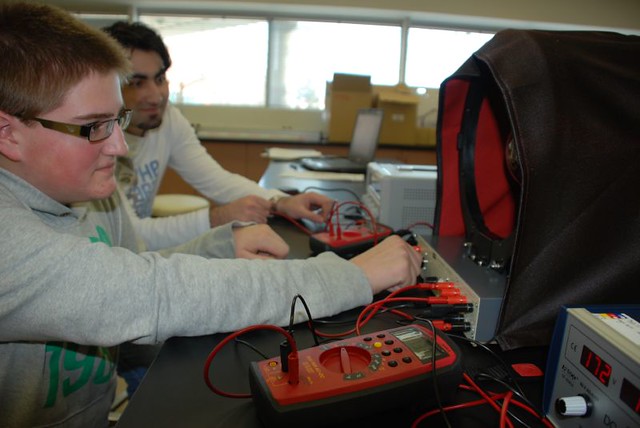My late father-in-law, Dr. James Garnett Lyne, used to refer to what he called 'mass mediocrity' whenever he discussed education. Like me, he was a product of a public school education. Neither of our parents could afford a private school education.
What did he mean by 'mass mediocrity'? He was referring to what he feared would be the result of a general lowering of standards in our schools. He argued that the less qualified teachers were, the less they were paid and the less demanding high school curricula were, the more we as a society would descend into 'mass mediocrity'. Dr. Lyne has been gone for 45 years. Yet his prescient words still haunt me. You see, back then, I had no clue what he was talking about. None. That scholarly father-in-law of mine was given to many well-reasoned pronouncements. I figured that this was just one more and filed it away in my memory bank.
This video from Toastmasters International offers five tips for effective public speaking.
Graduates lack basic business skills
In my own daily life and work, I am well aware of what high school graduates - both public and private school graduates - bring to the table. The lack of basic business communication skills is appalling. And I don't think that Twitter and texting is the reason. I remain convinced until somebody can show me otherwise that most high school students are simply not taught how to write business communications. They might have had one short lesson on that skill in English class in middle school. That's it.
The inability to work hard and finish a project on time is another complaint of mine. Producing results in a timely manner is a trait most employers value extremely highly. Not giving an employer a full day's work is stealing as far as I am concerned. The employer is paying for eight hours of work. The employee arrives late for work, takes an extra half hour for lunch, and spends another hour over the course of her day chatting in the break room or IM'ing her friends on her smartphone. Why? Honestly, I have not been able to get a straight answer to this question. I think it might have something to do with a sense of entitlement.
This video discusses the concept of tolerance.
A Lack of Tolerance
The lack of tolerance and respect for others is yet another characteristic about which I could write a book or two. Too many freedoms? Too much self-expression of the wrong kind? I honestly don't know. But the cyberbullying and ostracizing of classmates and people who happen to be different seems all too prevalent in our schools, and, indeed, in society as a whole. My mother always taught us that if you couldn't say anything nice, don't say anything at all. She was really teaching us the value of the Golden Rule. "Do unto others as you would have them do unto you" establishes some very basic ground rules for behavior. Nobody is telling you that you have to like somebody else's opinion. Just show the other person the respect she and her opinion deserves.
Strive for Excellence
Our children need to strive to be the best students they can be. A C-grade is just not going to cut it these days in the real world. It's a global community into which we are releasing our high school graduates. Solid achievements in math, the sciences, and foreign languages are merely the foundation on which higher learning is built. If we try to build our future on mediocrity, we will fail miserably. Once again, nobody is asking students to be the next Albert Einstein or Marie Curie. What we are asking them to do is to be the very best they can be. In whatever they have chosen to do.
Unfortunately, our society sees success in monetary terms. CEOs and professional athletes who make mega-millions are symbols of success. Why bother studying hard and getting A+s when you can make more money than you could ever imagine on a tennis court or football field or in the executive suite?
This video explains what's involved with the IB diploma course.
Stretching Our Children
Real academic hard work involves stretching your child's mind and perceived capabilities. "I can't" gives way to "I can do anything" when you take this approach. If you are fortunate enough to live in an area with good public schools that have a strong academic program, then make sure your child takes the most challenging courses she can. If public education won't work, then find a private school which will. Your child's brainpower is too precious to waste. It needs to be used to the max. It needs to be stretched.
Examples of tough academic courses include the International Baccalaureate program. The writing and research expected of an IB candidate is done to a very high university entrance standard. Explore the IB program and you will see why proponents of the IB program are so enthusiastic about it.
Advanced Placement courses have been around for many years. But most parents probably are not aware that there are over 30 AP courses. So if your school offers only a couple of AP courses, you need to ask yourself if this is what you really want for your child.
Education Options
If you prefer an educational approach without the unrelenting focus on tests and test scores, you should explore whether a progressive school might work better for your child. Don't think for a second that she is not going to work hard and be stretched in a progressive school environment. Au contraire! She will have to use all of that considerable brainpower of hers. Only the approach is different.
Whether you settle on a traditional school or a progressive school, the presence of a demanding curriculum taught by knowledgeable, experienced teachers with degrees in their subjects is a must in my opinion. Learning physics from a teacher who did her bachelor's and her masters in the subject is going to be a completely different experience for your child than learning from a teacher whose first degree is not even in the subject he is teaching.
Your child needs to know how to frame an argument and present it effectively. Again, he can be a brilliant child but if he cannot present his ideas effectively he will lose out to children who understand how to communicate. Your child was born brilliant. That cannot be taught. Communications and all these other skills can be taught. Just remember to teach them.
Extracurricular activities and sports provide the laboratory experience every teenager needs in order to learn how to compete successfully and work with her classmates. How can these be optional when they are clearly so important to your child's growth and development as a whole person?
One final word about what you as a parent must do. You need to partner with your school - public or private - and support it. You need to encourage your child constantly. Positive re-enforcement is so critical for teenagers. Expect the occasional failure. That's normal. Don't dwell on it. Focus on what she can learn from failure. After all, you learned by making mistakes, didn't you? Think of the school as an airplane. You are the pilot. She is your passenger. The school can only do its job successfully if everybody does their bit.
Mass mediocrity? I like to think that my late father-in-law was simply warning anybody who would listen that we all need to be responsible for our children's education. When we accept that responsibility, we all can expect more than 'C' grades from our children. When we expect greatness, our children will strive to be the best they can be.
Questions? Contact us on Facebook. @privateschoolreview






























